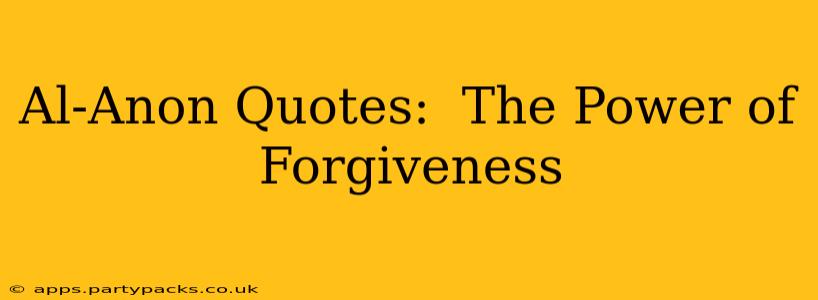Forgiveness. It's a word that holds immense weight, especially for those navigating the challenging landscape of living with someone struggling with alcoholism or addiction. Al-Anon, a fellowship that offers support to friends and family members affected by another's drinking, understands this struggle intimately. Through shared experience and mutual support, Al-Anon members find strength, solace, and a path towards healing – a path often paved with the powerful act of forgiveness. This exploration delves into the profound impact of forgiveness within the Al-Anon framework, examining key Al-Anon quotes that illuminate its transformative power.
Understanding Forgiveness in Al-Anon
Forgiveness in Al-Anon isn't about condoning harmful behaviors. It's not about forgetting the pain or minimizing the impact of someone's actions. Instead, it's about releasing the resentment, anger, and bitterness that can consume us when we focus on the past. It's about freeing ourselves from the emotional shackles that prevent us from moving forward and finding peace. The focus is on our own well-being and recovery, recognizing that holding onto anger only hurts us.
This process is often gradual, not a sudden epiphany. It involves self-reflection, acceptance of the situation, and a willingness to let go. Many find that the principles of Al-Anon, such as detachment and self-care, are crucial steps on this journey.
Key Al-Anon Quotes on Forgiveness
While Al-Anon doesn't ascribe specific quotes to particular individuals, the collective wisdom shared within the fellowship resonates with powerful messages of forgiveness. These themes are often expressed through shared experiences and the principles discussed in meetings. The essence of these unspoken quotes can be summarized as follows:
"Forgiveness is not for them; it's for me."
This encapsulates the core principle of Al-Anon forgiveness. It's not about excusing the other person's behavior; it's about releasing ourselves from the burden of carrying the pain. Holding onto anger and resentment keeps us trapped in the past, preventing us from healing and moving on. Forgiveness is a gift we give ourselves.
"I can't control their drinking, but I can control my reaction."
This highlights the importance of focusing on what we can control: our own thoughts, feelings, and actions. By detaching from the addict's behavior and focusing on self-care, we empower ourselves to respond constructively rather than reactively. This detachment is a necessary precursor to forgiveness.
"Letting go of the need to change them allows me to change myself."
This acknowledges the futile nature of trying to control someone else's behavior. Focusing on personal growth and self-improvement is far more productive than trying to force change upon another person. Forgiveness becomes possible when we accept that we cannot change them and focus on our own healing and growth.
"Acceptance, not approval, is the key."
This emphasizes the difference between acceptance of reality and approval of someone’s behavior. We can accept that someone is struggling with alcoholism without condoning their actions. This acceptance allows for a less judgmental perspective and paves the way for forgiveness.
How to Practice Forgiveness in Al-Anon
The journey towards forgiveness isn't always easy. It requires consistent effort, self-compassion, and a willingness to seek support. Here are some suggestions:
- Attend Al-Anon meetings: Sharing your experiences with others who understand can be incredibly validating and supportive.
- Practice self-care: Prioritize your physical and emotional well-being through activities like exercise, healthy eating, and mindfulness.
- Seek professional help: A therapist can provide guidance and support in navigating the complex emotions surrounding forgiveness.
- Journaling: Writing down your thoughts and feelings can be a powerful tool for processing emotions and gaining clarity.
Conclusion
Forgiveness, within the Al-Anon framework, is a powerful tool for healing and recovery. It's a process, not a destination, and it requires consistent effort and self-compassion. By embracing the principles of Al-Anon and focusing on self-care, members find strength and the capacity to forgive, ultimately freeing themselves from the burden of resentment and moving towards a healthier, more peaceful life. The journey is personal, but the shared experiences and wisdom within Al-Anon provide a beacon of hope and guidance along the way.

